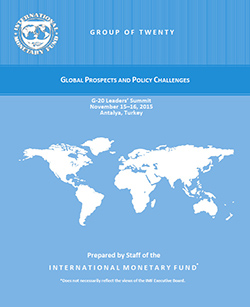Related Links
- Staff Background Paper for G20 Surveillance Note—International Migration: Recent Trends, Economic Impacts, and Policy Implications
November 12, 2015 - Migration: A Global Issue in Need of a Global Solution
- IMF and the Group of Twenty
- G-20 Agreement on Quotas and Governance
- List of G-20 Surveillance Notes
- World Economic Outlook Reports
- World Economic Outlook Databases
Group of Twenty IMF Note — G-20 Leaders' Summit
IMF Note on Global Prospects and Policy Challenges
November 15-16, 2015
The Following executive summary is from a note by the Staff of the IMF prepared for the November 15-16, 2015 G-20 Leaders' Summit in Antalya, Turkey.
Read the Full text ![]()
Executive Summary
In an environment of increased uncertainty, three significant transitions weigh on the global outlook: (i) the Federal Reserve is poised to normalize monetary policy while other major currency areas will likely be easing further; (ii) China's economy is experiencing a needed moderation as it embarks on a historic and multi-year rebalancing of its growth model; and (iii) the decade-long commodity super cycle appears to be over. At the same time, international migration has become a pressing economic issue for both sending and receiving countries, particularly in light of the ongoing refugee crisis.
After a modest and uneven expansion in 2015, the global economy is expected to grow next year at 3.6 percent which, given sluggish global growth since the crisis, would be the fastest pace since 2011. The projection is contingent on a confluence of favorable factors, with major advanced economies continuing to benefit from supportive monetary conditions and lower commodity prices. After 5 years of decline—capped by a turbulent summer—emerging market economies would also be expected to pick up next year, as growth in distressed economies is less negative or recovers.
However, if the transitions are not successfully navigated, global growth could be derailed. Fed lift-off could increase financial market volatility, with potentially disruptive moves in capital flows and asset prices. While welcome, China's rebalancing is generating large global spillovers, and, notwithstanding the Chinese economy's sizable buffers, could be bumpy. For commodity exporters, persistently low prices will strain fiscal resources and dampen growth. With global economic prospects repeatedly marked down over the last five years, there is a concrete risk of a world economy persistently mired in sub-par growth, with unacceptably high levels of poverty and unemployment.
To secure a strong and durable recovery, policies need a decisive upgrade. G-20 members are grappling with difficult trade-offs in the face of limited room for maneuver and a need to adapt to new realities. This calls for a policy upgrade that combines structural reforms to raise future growth with effective demand-side measures that support today's growth and maintain stability.
- Lifting today's growth. Economic slack and very low inflation justify continued monetary accommodation in most major advanced economies. Meanwhile, fiscal policy needs to be more supportive where conditions allow, even as credible medium-term budget plans are put in place. In emerging and developing economies, demand support should be carefully weighed against the need to manage vulnerabilities.
- Bolstering resilience. At the global level, there is a pressing need to complete and implement the regulatory reform agenda―an important policy upgrade. Advanced economies should strengthen regulation and supervision of rapidly expanding financial activities outside the banking system. In emerging market and developing economies, solid policy frameworks will be crucial. Where feasible, exchange rate flexibility should serve as a shock absorber, with a temporary role for both intervention and capital flow management measures under more disorderly market conditions.
- Safeguarding the future. Decisive implementation of the G20's growth strategies agreed in Brisbane last year will be a significant policy upgrade. Measures to improve resource allocation and tackle structural rigidities are urgently needed to lift growth potential and improve living standards.
- International cooperation. China's economy needs to transition toward a slower, more sustainable growth path. A successful transition will benefit global growth and reduce tail risks. In the short run, the transition process is likely to entail spillovers through trade and commodities, which could be amplified by financial channels. Nonetheless, the international community should support China in this difficult endeavor. Collective efforts also need to be renewed to enhance the global safety net and strengthen the resilience of the International Monetary System. Implementing IMF quota and governance reforms would be crucial in this regard. Global cooperation is vital for addressing the large-scale displacement of people: policies include enhanced global development diplomacy to prevent, contain, and respond to humanitarian crises and more flexible and innovative financing instruments to ensure adequate and effective assistance.
Read the Full text ![]()













